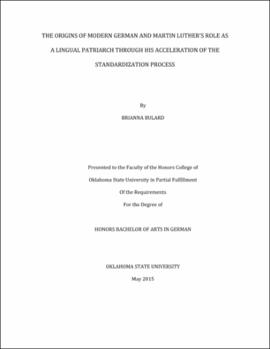| dc.contributor.author | Bulard, Brianna | |
| dc.date.accessioned | 2021-04-19T21:13:20Z | |
| dc.date.available | 2021-04-19T21:13:20Z | |
| dc.date.issued | 2015-05-01 | |
| dc.identifier | oksd_bulard_HT_2015 | |
| dc.identifier.uri | https://hdl.handle.net/11244/329239 | |
| dc.description.abstract | The objective of this paper is to provide a broad overview of the historical developments of the German language and the challenges the language faced that kept it from being significantly standardized up until Martin Luther published his translation of the Bible into German. In order to fully understand the impact that Luther had on the language, a documentation of historical obstacles the language faced up until the time of Luther must be observed. Luther's main contribution was a translation, which in turn accelerated the process of standardization. In the following pages, I have briefly covered the history of the German language and the hindrances it faced for regularization up until Martin Luther accelerated the process through his translation of the Bible. | |
| dc.description.abstract | The claim that Martin Luther simply created the modern German standard language is oversimplified. The process of unifying numerous dialects and linguistic landscapes into one written language was a task that exceeded the capabilities of one individual. Certain points in history did allow for a gradual coming together of the language, but overall the German written language developed slowly, and had many interruptions and obstacles over the centuries which prevented any kind of significant standardization. Martin Luther, however, was able to accomplish something that had been prevented throughout history; he was able to create a variety of German universally understood and accepted by the people. In this way, he did not create the German Standard language from nothing, but rather unified what was already present. In this way he was the lingual patriarch, not of all the German dialects, but of the Standard High German language, which, in turn, shaped the Modern German spoken today, more than any other one person in history. | |
| dc.format | application/pdf | |
| dc.language | en_US | |
| dc.language | de_DE | |
| dc.rights | Copyright is held by the author who has granted the Oklahoma State University Library the non-exclusive right to share this material in its institutional repository. Contact Digital Library Services at lib-dls@okstate.edu or 405-744-9161 for the permission policy on the use, reproduction or distribution of this material. | |
| dc.title | Origins of modern German and Martin Luther's role as a lingual patriarch through his acceleration of the standardization process | |
| osu.filename | oksd_bulard_HT_2015.pdf | |
| dc.type.genre | Honors Thesis | |
| dc.type.material | Text | |
| dc.contributor.director | Te Velde, John R. | |
| dc.contributor.facultyreader | Schestokat, Karin | |
| thesis.degree.discipline | German | |
| thesis.degree.grantor | Oklahoma State University | |
